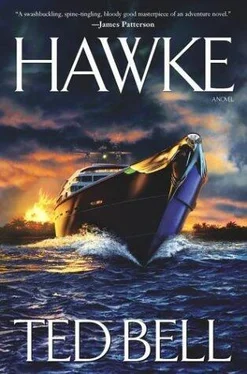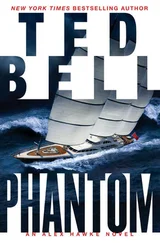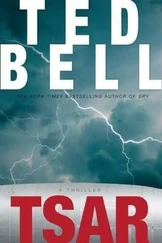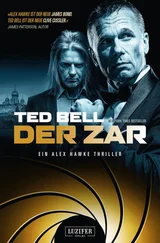Since their beloved comrades in Moscow had abandoned them in the early nineties, his country’s economy had crashed and burned. Cuba now had one of the lowest per capita incomes in the Caribbean, ranking right up there with that other economic powerhouse, Haiti. He was sure that el jefe wasn’t mentioning that little economic tidbit in his remarks.
The Soviets had poured a hundred billion dollars into the island of Cuba. Where had it all gone, Manso and his band of disgruntled confederates wondered.
A short list: the army, its uniforms, and missiles. The now-outdated electric power system. A nuclear power plant intended to wean Cuba off foreign oil and left two-thirds completed. A twenty-six-square-mile intelligence-gathering complex outside of Lourdes that Fidel was now trying to peddle to the Chinese. And countless enormous, hideously ugly residential buildings now falling down around their ears because of the amazingly shoddy construction.
And of course, there was the highway system. Ah, yes. Since shortages of fuel, oil, and machinery parts had paralyzed transportation, the endless miles of highways were utterly useless. Sugar production, the economy’s mainstay, had been cut in half. New tourism efforts were helping some, but not nearly enough. Unless drastic measures were taken, Cuba, already running on fumes, would soon be running on empty.
Manso shifted in his chair. The metal seat had begun to roast his backside to a crisp. The hot seat reminded him of yet another misery, the shortage of paper. No books, no magazines, no toilet paper. Thank God for the limitless supply of Marxist economic textbooks that the Cuban populace had finally, after forty years, put to good use.
They also found the Communist paper, Granma, very useful. Published only every other day, it consisted of eight pages full of pap about la lucha, the “struggle,” and how the people must endure these sacrifices for the greater glory. Manso had read an article that very morning stating that not eating was good for you! Privately, Manso had taken to calling Granma the Toilet Paper.
But there was no shortage of speeches and dedications like this one, Manso thought, mopping his brow. The production of speeches, dedications, and pontifications, always high, had recently gone through the roof.
The comandante, at the podium well over an hour or so already, was warming to his theme. As if it weren’t warm enough already, Manso thought, reaching for a cup of iced lemonade beneath his chair. The ice had melted but the tangy juice helped a little.
Out on the lawn, Manso’s olive-green helicopter was waiting. In approximately one half hour, God willing, he and the comandante were scheduled to depart for Manso’s retreat on the southeast coast for the weekend. The two of them would be flying out alone, with Manso at the controls of the aging Kamov 26 helicopter gunship.
Before Fidel had made him head of State Security, Manso had been the highest-ranking colonel in the Air Force. He had a distinguished flying record and many decorations. He was also the only pilot in Cuba to whom the comandante would entrust his life.
The flying time to his personal estate, Manso estimated, was just less than two hours. The weather was perfect, but it still promised to be an exciting flight.
Manso’s estate occupied a good deal of the five thousand acres of an island just off the town of Manzanillo. Manso, whose boyhood nickname had been Araсa, the spider, had called the place Finca Telaraсa, the Spider’s Web. Originally, it had been just a casita on the balmy shores of the Golfo de Guacanayabo. A little retreat, where he and the great leader could escape the pressures of La Habana and have a little fun.
Over the years, Manso had gotten very good at finding ever newer and more interesting ways of keeping el comandante amused. There was, of course, no shortage of girls willing to do anything for money or el jefe.
The most recent event Manso had staged at Finca Telaraсa was a tree-climbing contest. About ten local beauty queens had participated. They had stripped and raced for the trees. The winner got an expensive jeweled watch, while the losers had to shave their heads, eat a few live insects, and perform an elaborate dance number while everyone else enjoyed an exquisite buffet.
Manso supplied the female pipeline and he kept it full. This talent had helped his career in the Air Force enormously. Not to mention the size of his personal fortune. Manso had also done many favors for his leader. Favors Castro would entrust to no one else.
“He has become an inconvenience, Manso” was all that needed to be said. The man, or his entire family, would disappear. Always with a knife, never a gun. Guns, Manso had discovered very early in life, were no fun at all. He had grown up in the cane fields of Oriente province. He had learned that a razor-sharp machete made him the equal of bigger, stronger, and even wiser men.
When he was still a boy, he had formed a small band known as the Macheteros. The machete wielders. Once, barely twelve, he and his two brothers had kidnapped a staff member of the Soviet consulate. The Russian bastard had insulted his mother in the street. They’d placed him in a cotton sack and taken him at midnight out into the cane fields. Swigging rum up in the cab of the stolen pickup, the three brothers laughed at the man bouncing around in the back of the truck’s bed as they careened through the tall cane.
His two brothers held the man’s arms. Manso suddenly stepped forward and whipped off the sack covering the man’s head. When the man saw a glint of moonlight on Manso’s upraised blade, he started begging. He was still pleading when Manso casually lopped off his head, spraying the three boys with blood. It was Manso’s first taste of blood and he found that he liked it.
He’d had the head delivered in a piсata to the Soviet embassy. This spectacular crime, and the ensuing manhunt for Manso and his two brothers, had caused them to flee their homeland. They headed straight for their uncle’s village in the mountains of Colombia. Their mother, a Colombian, had a brother who was a coca farmer in a thriving little hamlet called Medellin.
In the long chain of lucky events that would mark his life, the murder of the Russian brought Manso to the attention of Fidel Castro himself. Normally, this would have resulted in his capture, torture, and execution. The Soviets wanted Manso’s head, that was certain. They’d even sent investigators and detectives all the way from Moscow in search of the murderous de Herreras brothers.
By the time the Russian investigators reached Cuba, Manso and his young brothers were in Colombia, at the forefront of a burgeoning new industry. They were using high-powered speedboats, committing acts of sea piracy, and running cocaine for a Colombian madman called el doctor.
El doctor, it didn’t take Manso long to discover, was not a doctor at all.
He was a murderous psychopath. A squat little man who’d gotten his start stealing headstones from the local cemeteries, sandblasting them, and then reselling them. El doctor was the honorary sobriquet given to the young drug kingpin Pablo Escobar in honor of the first man he murdered, a man who happened to be a doctor.
Murder was not an unusual way to earn a nickname in Colombia. But this particular murder would mark the beginning of a reign of terror that would end only when Pablo himself was murdered at age forty, in 1989. At the time of his death, the former tombstone salesman, Pablo Escobar, was the richest, most powerful criminal in the world.
Читать дальше












